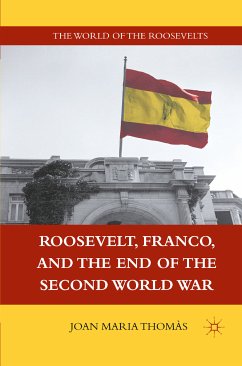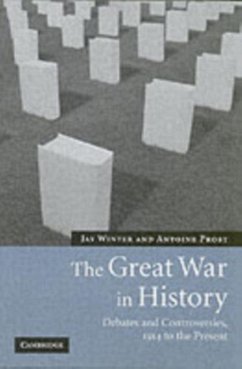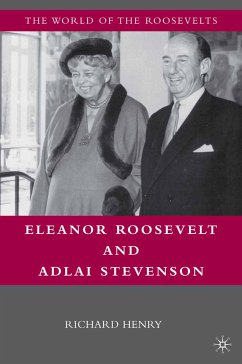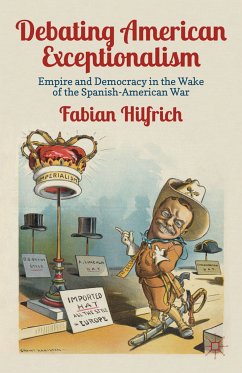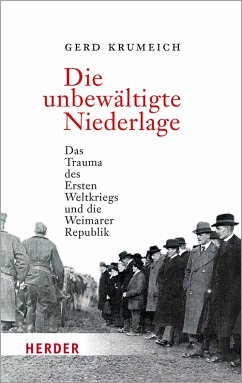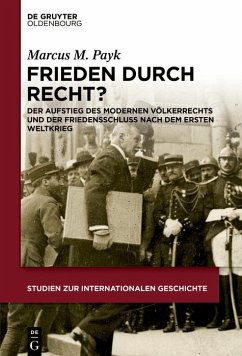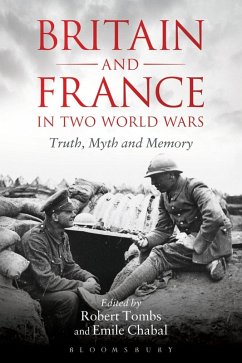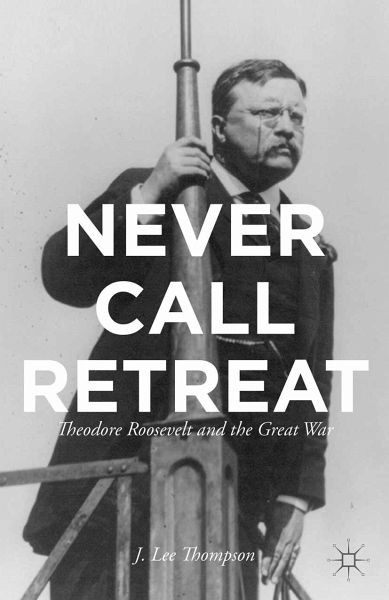

PAYBACK Punkte
10 °P sammeln!






The first modern account of Theodore Roosevelt and the First World War, this is a tale of war and politics as well as the private story of true love and family devotion: a story as multi-faceted as TR's own personality.
Dieser Download kann aus rechtlichen Gründen nur mit Rechnungsadresse in A, B, BG, CY, CZ, D, DK, EW, E, FIN, F, GR, HR, H, IRL, I, LT, L, LR, M, NL, PL, P, R, S, SLO, SK ausgeliefert werden.
J. Lee Thompson is a fellow of the Royal Historical Society and a Professor of History at Lamar University, USA. His previous books include Theodore Roosevelt Abroad and A Wider Patriotism: Alfred Milner and the British Empire. His work has been featured on C-SPAN and other venues, and he is a visiting Fellow at Cambridge University.
Produktdetails
- Verlag: Palgrave Macmillan US
- Seitenzahl: 362
- Erscheinungstermin: 15. Januar 2014
- Englisch
- ISBN-13: 9781137306531
- Artikelnr.: 40720573
"The book is a fine study of the foreign policy life of Roosevelt during this period ... . It is, therefore, a good book, a good historical narrative of people, ideas, and events." (Greg Kennedy, Diplomacy & Statecraft, Vol. 27 (1), 2016)
"In Never Call Retreat, historian and professor J. Lee Thompson has produced an engaging, well-researched, and thoroughly documented narrative history of Roosevelt's Great War years that provides greater detail than any previous historical account. ... this is a fascinating work that displays all the intellectual vitality for which Roosevelt was known throughout his life. We can thank the author for reminding us just how energetic the Old Lion remained throughout the years of the World's greatest
"In Never Call Retreat, historian and professor J. Lee Thompson has produced an engaging, well-researched, and thoroughly documented narrative history of Roosevelt's Great War years that provides greater detail than any previous historical account. ... this is a fascinating work that displays all the intellectual vitality for which Roosevelt was known throughout his life. We can thank the author for reminding us just how energetic the Old Lion remained throughout the years of the World's greatest
Mehr anzeigen
war to date." (Mark E. Grotelueschen, Presidential Studies Quarterly, December, 2015)
'In an aggregate of scholarly rankings from 1948 to 2011 of the American presidents, Theodore Roosevelt scores an impressive number 5 position, putting him among those chief executives most historians consider great. And yet, among many historians and non-historians alike, the image of TR is inevitably marred by his willingness to go to war whenever the interests or even the honor of the United States seemed under threat. Surely, this collective cognitive dissonance explains why so many notable historians and biographers even the great Edmund Morris have been loath to explore Roosevelt's attitude and activism during the Great War, both before and after U.S. entry into it. In Never Call Retreat, J. Lee Thompson addresses this highly significant historical lacuna by telling two remarkable stories, whose telling is long overdue. One is the narrative of TR's ex-presidential life and public engagement, and the other is the profile of intelligent opposition to Wilsonian neutrality. Until now and Thompson's book the story of former president Theodore Roosevelt was cast in the shadows, and the argument for American engagement in the 'European' war was left largely unexplored and certainly uncelebrated. Thompson's quiet, comprehensive, utterly fascinating book is not written in a style intended to create controversy. But it will at long last create controversy nonetheless.'
Alan Axelrod, author of Selling the Great War: The Making of American Propaganda
and Miracle at Belleau Wood: The Birth of the Modern U.S. Marine Corps
'It has been nearly a century since Theodore Roosevelt's death in 1919, yet scholars of US foreign policy remain keenly interested in the life and times of this extraordinary (that is not too strong a word) political figure, who currently ranks among the most effective and well-regarded of all the country's chief executives. Now, to the list of distinguished titles on the political career and personal biography of the 26th president, J. Lee Thompson adds a volume that is destined to become the definitive work about a critical, if poorly understood, phase of Rooseveltian political activism, his campaign on behalf of 'preparedness' and American entry into the First World War. Anyone who believes that bitter partisanship is only a recent characteristic of the American political scene will be forced to think again after reading this superb book. In prose that crackles repeatedly with high drama, Never Call Retreat brings to life the passion and energy commanded by Roosevelt as he waged a public and bitter battle against his great antagonist, Woodrow Wilson. Thompson tells the story, in fascinating and gripping detail, of Roosevelt's increasingly strident campaign on behalf of early American intervention in a war from which Wilson hoped America could remain aloof. This book is political history at its finest.'
David G. Haglund, Professor of Political Studies, Queen's University
'Following on the great work of William Harbaugh and Edmund Morris, J. Lee Thompson offers here a detailed and clearly presented narrative account of Theodore Roosevelt's experience and political activity through the Great War to his untimely death in January 1919. Thompson sensitively combines an extensive account of TR's relations with his associates and friends at home and abroad with equal attention to a family life filled with great love and concern.'
Douglas Eden, author of 'Could Rooseveltian Diplomacy Have Prevented the Great War?'
in L'héritage de Théodore Roosevelt, 'Theodore Roosevelt and the British'
in America's Transatlantic Turn, and 'America's First Intervention in European Politics: Theodore Roosevelt and the European Crisis of 1905-1906' in A Companion to Theodore Roosevelt
'In an aggregate of scholarly rankings from 1948 to 2011 of the American presidents, Theodore Roosevelt scores an impressive number 5 position, putting him among those chief executives most historians consider great. And yet, among many historians and non-historians alike, the image of TR is inevitably marred by his willingness to go to war whenever the interests or even the honor of the United States seemed under threat. Surely, this collective cognitive dissonance explains why so many notable historians and biographers even the great Edmund Morris have been loath to explore Roosevelt's attitude and activism during the Great War, both before and after U.S. entry into it. In Never Call Retreat, J. Lee Thompson addresses this highly significant historical lacuna by telling two remarkable stories, whose telling is long overdue. One is the narrative of TR's ex-presidential life and public engagement, and the other is the profile of intelligent opposition to Wilsonian neutrality. Until now and Thompson's book the story of former president Theodore Roosevelt was cast in the shadows, and the argument for American engagement in the 'European' war was left largely unexplored and certainly uncelebrated. Thompson's quiet, comprehensive, utterly fascinating book is not written in a style intended to create controversy. But it will at long last create controversy nonetheless.'
Alan Axelrod, author of Selling the Great War: The Making of American Propaganda
and Miracle at Belleau Wood: The Birth of the Modern U.S. Marine Corps
'It has been nearly a century since Theodore Roosevelt's death in 1919, yet scholars of US foreign policy remain keenly interested in the life and times of this extraordinary (that is not too strong a word) political figure, who currently ranks among the most effective and well-regarded of all the country's chief executives. Now, to the list of distinguished titles on the political career and personal biography of the 26th president, J. Lee Thompson adds a volume that is destined to become the definitive work about a critical, if poorly understood, phase of Rooseveltian political activism, his campaign on behalf of 'preparedness' and American entry into the First World War. Anyone who believes that bitter partisanship is only a recent characteristic of the American political scene will be forced to think again after reading this superb book. In prose that crackles repeatedly with high drama, Never Call Retreat brings to life the passion and energy commanded by Roosevelt as he waged a public and bitter battle against his great antagonist, Woodrow Wilson. Thompson tells the story, in fascinating and gripping detail, of Roosevelt's increasingly strident campaign on behalf of early American intervention in a war from which Wilson hoped America could remain aloof. This book is political history at its finest.'
David G. Haglund, Professor of Political Studies, Queen's University
'Following on the great work of William Harbaugh and Edmund Morris, J. Lee Thompson offers here a detailed and clearly presented narrative account of Theodore Roosevelt's experience and political activity through the Great War to his untimely death in January 1919. Thompson sensitively combines an extensive account of TR's relations with his associates and friends at home and abroad with equal attention to a family life filled with great love and concern.'
Douglas Eden, author of 'Could Rooseveltian Diplomacy Have Prevented the Great War?'
in L'héritage de Théodore Roosevelt, 'Theodore Roosevelt and the British'
in America's Transatlantic Turn, and 'America's First Intervention in European Politics: Theodore Roosevelt and the European Crisis of 1905-1906' in A Companion to Theodore Roosevelt
Schließen
Für dieses Produkt wurde noch keine Bewertung abgegeben. Wir würden uns sehr freuen, wenn du die erste Bewertung schreibst!
Eine Bewertung schreiben
Eine Bewertung schreiben
Andere Kunden interessierten sich für



